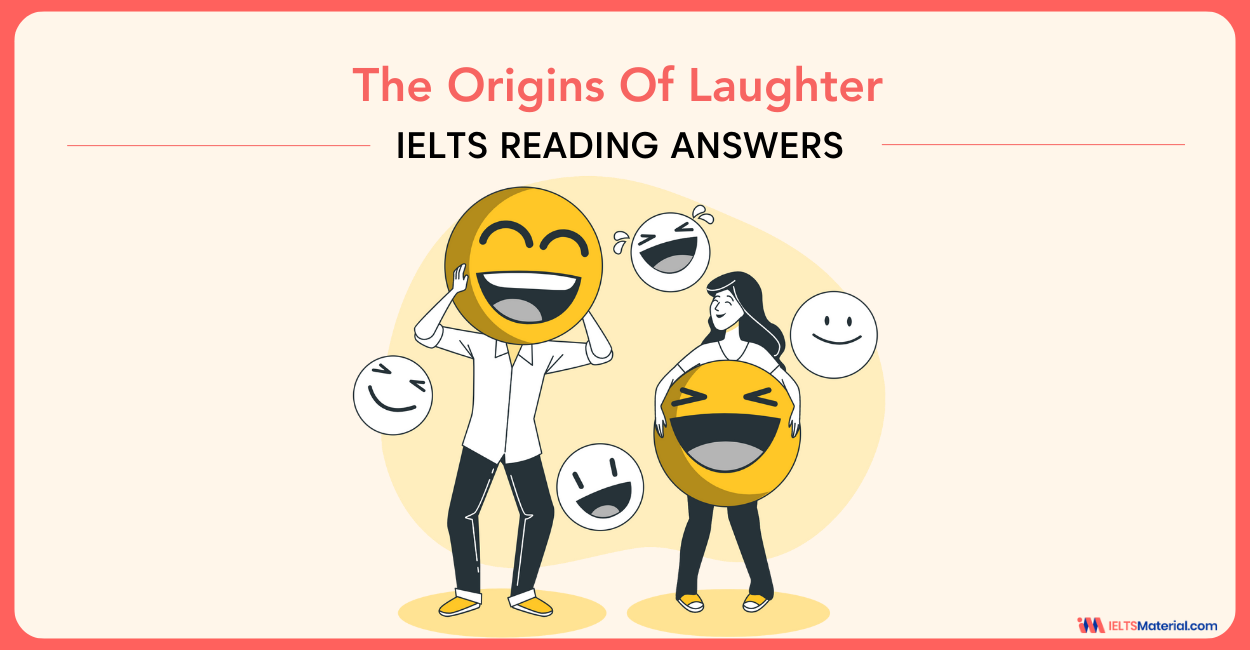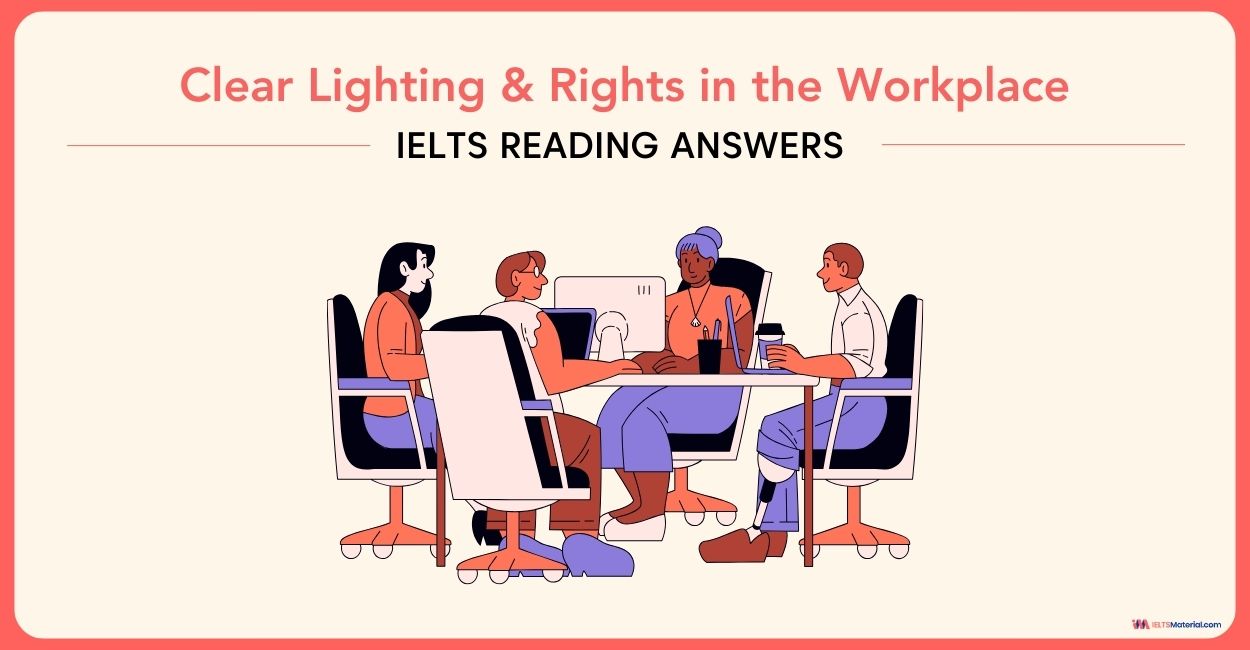Clear Lighting & Rights in the Workplace – IELTS Reading Answers
10 min read
Updated On
-
Copy link
Table of Contents
Limited-Time Offer : Access a FREE 10-Day IELTS Study Plan!
The passages, Clear Lighting and Rights in the Workplace comprise a part of an IELTS General reading test.
The Reading Module can be the top-scoring category for IELTS aspirants, with diligent practice. To score well, you must understand how to approach and answer the different question types in the Reading Module.
You must scan the material for important terms, comprehend the subject, and then respond in accordance with the instructions. Also, read the IELTS reading passages, pick out significant words, and recognise synonyms in order to provide a one-word response.
The question types found in this passage are:
- Sentence Completion (Q. 1-7)
- True/False/Not Given (Q. 8-13)
Are you worried about answering the sentence completion questions??
Check out the video below to get some more quick tips that will help you attempt the questions given below!
Reading Passage 1
Clear Lighting
Use energy more efficiently and help save the planet by switching to low-energy light bulbs.
Many of us still use traditional bulbs around the house. But simply replacing one traditional 100-watt bulb in your home with a low-energy equivalent will save you the amount of electricity required to make 1200 cups of tea. It will also reduce your annual electricity bill, so as well as using less energy, you’ll be paying less money. This is because traditional bulbs only use 10% of the electrical energy to produce light, while the remaining 90% Is wasted as heat. Low-energy bulbs, which are also known as compact fluorescent lamps, or CFLs, are more efficient because most of the electrical energy is used to generate actual light instead.
CFLs are more expensive to buy, costing an average of 6 pounds each compared to 40p for a traditional equivalent, but they work out cheaper in the long run because they use less electricity and are much more durable, lasting at least six times longer.
However, they do have some drawbacks. For example, they can have a slow start-up, taking some time to reach their full brightness, so you are recommended to use them where they will be left on for longer periods, such as your living room or hallway. This also avoids frequent switching on and off, which may also shorten the life of the bulb.
CFLs are also noticeably dimmer when used in cold conditions, such as in a garage or outside, as this can reduce the bulb’s efficiency, so this is not recommended. Finally, CFLs are also likely to be up to three times heavier than traditional bulbs, which may make them unstable for some light fittings, so you should always check these before changing your bulbs.
Questions 1-7
Complete the sentences below with words taken from Questions 1-7.
Choose NO MORE THAN THREE WORDS for each answer.
Write your answers in boxes, 1-7, on your answer sheet.
1 If you change your type of light bulb you could save both energy and ……………….
2 Conventional bulbs convert most of the energy they use into …………………
3 You do not need to replace CFLs every often because they are very ………………….
4 When they are first switched on, CFLs may have a …………………………..
5 Constantly using the light switch may ………………………. of a CFL.
6 Low temperatures may reduce the ………………………… of CFLs.
7 CFLs may weigh more than other bulbs, so you must only use them with appropriate …………………………
To get access to a treasure trove of the best IELTS material, book a demo class for FREE!
Reading Passage 2
Rights in the Workplace
This leaflet explains your legal rights when you are at work, including what your employer must (and must not) do for you.
Do l need a contract?
A written contract of employment is useful to have because it sets out what you can expect from your job and from your employer. There are laws to protect workers, whether or not they have a written contract.
Every worker has the right to be paid and to enjoy a reasonably safe place of work. You also have certain legal rights, such as the right not to be discriminated against at work because of your sex, race or disability.
What can I do if I don’t have a written contract?
Every employee has a legal right to receive a written statement which sets out your terms of employment. You should get this within eight weeks of starting your job. The terms include basic things like the name of your employer and where you will be working, the date you started work, how much you will earn and when you will be paid. It will also include terms about your hours of work, your holiday entitlement and any benefits, such as holiday and sickness pay and pensions. It should also state the length of notice you both have to give, as well as any disciplinary rules.
In many cases, employers don’t do all of this. They either give employees a short offer letter or nothing at all. This is partly because an employer can’t be fined for not giving you a proper contract. If you want a contract, but your employer won’t give you one, all you can do is apply to an employment tribunal for a list of what should be included in your written statement.
Questions 8-13
Do the following statements agree with the information given in the text?
In boxes 8- 13 on your answer sheet write:
TRUE if the statement agrees with the information
FALSE if the statement contradicts the information
NOT GIVEN if there is no information on this
8 Employers have to provide written contracts for their employees.
9 There are laws to ensure that people are treated equally at work.
10 A written statement has the same value as a contract.
11 Employers should give written terms of employment to employees in the first two months of the job.
12 Employers must contribute towards their employees’ pensions.
13 An employment tribunal can force employers to issue contracts.
Clear Lighting & Rights in the Workplace Reading Answers With Location and Explanation
1 Answer: money
Question type: Sentence Completion
Answer location: Paragraph 1, line 2- line 3
Answer explanation: In the given location, it is given that “But simply replacing one traditional 100-watt bulb in your home with a low-energy equivalent will save you the amount of electricity required to make 1200 cups of tea. It will also reduce your annual electricity bill, so as well as using less energy, you’ll be paying less money.”. This means that by changing the type of bulb (from 100-watt to low energy equivalent), one can save electricity (energy) as well as money (reduce annual electricity bill). Hence, the answer is ‘money’.
2 Answer: heat
Question type: Sentence Completion
Answer location: Paragraph 1, line 4
Answer explanation: In the mentioned line, it is given that “This is because traditional bulbs only use 10% of the electrical energy to produce light, while the remaining 90% Is wasted as heat.”. In other words, conventional (traditional) bulbs convert most (90%) of the energy into heat. Hence, the answer is ‘heat’.
3 Answer: durable
Question type: Sentence Completion
Answer location: Paragraph 2
Answer explanation: In the cited location, it is stated that “…they work out cheaper in the long run because they use less electricity and are much more durable, lasting at least six times longer.”. It can be concluded that CFLs do not need to be changed quite often as they are durable and last six times longer. Hence, the answer is ‘durable’.
4 Answer: slow start-up
Question type: Sentence Completion
Answer location: Paragraph 3, line 2
Answer explanation: In the third paragraph, it is specified that “they can have a slow start-up, taking some time to reach their full brightness…”. It can be concluded that CFLs have a slow start-up and when they are switched on, they take some time to reach their full brightness. Hence, the answer is ‘slow start-up’.
5 Answer: shorten the life
Question type: Sentence Completion
Answer location: Paragraph 3, line 3
Answer explanation: In the mentioned line, it is stated that “This also avoids frequent switching on and off, which may also shorten the life of the bulb.”. It can be pointed out that using the CFLs constantly (frequent switching on and off) can shorten the life of the CFLs. Hence, the answer is ‘shorten the life’.
6 Answer: efficiency
Question type: Sentence Completion
Answer location: Paragraph 4, line 1
Answer explanation: From the specified line “CFLs are also noticeably dimmer when used in cold conditions, such as in a garage or outside, as this can reduce the bulb’s efficiency, so this is not recommended.”, it can be concluded that in cold conditions (lower temperatures), the efficiency of the CFLs are reduced. Hence, the answer is ‘efficiency’.
7 Answer: light fittings
Question type: Sentence Completion
Answer location: Paragraph 4, line 2
Answer explanation: In the cited line, it is stated that “Finally, CFLs are also likely to be up to three times heavier than traditional bulbs, which may make them unstable for some light fittings, so you should always check these before changing your bulbs.”. Based on this reference, it can be determined that since the CFLs are heavier than other bulbs, they do not work with light fittings and only appropriate fitting should be used. Hence, the answer is ‘light fittings’.
8 Answer: False
Question type: True/False/Not Given
Answer location: Paragraph 2, line 1 & Paragraph 5, line 3
Answer explanation: In the quoted line, it is stated that “A written contract of employment is useful to have because it sets out what you can expect from your job and from your employer…This is partly because an employer can’t be fined for not giving you a proper contract.”. This statement indicates that even though it is useful to have a written contract, it is not compulsory for employers to provide them. As the statement contradicts the information, the answer is False.
9 Answer: True
Question type: True/False/Not Given
Answer location: Paragraph 3, line 2
Answer explanation: The mentioned portion specifies that “You also have certain legal rights, such as the right not to be discriminated against at work because of your sex, race or disability.”. It can be inferred that every employee has legal rights (laws) that ensure that people are treated equally at work, irrespective of their sex, race or disability. As the statement agrees with the information, the answer is True.
10 Answer: Not Given
Question type: True/False/Not Given
Answer location: N.A.
Answer explanation: Although there is a mention of a written document in Paragraph 4, there is no reference whether the value of a written statement and a contract is the same. Hence, the answer is Not Given.
11 Answer: True
Question type: True/False/Not Given
Answer location: Paragraph 4, line 1-line 2
Answer explanation: In the respective section, it is noted that “Every employee has a legal right to receive a written statement which sets out your terms of employment. You should get this within eight weeks of starting your job.”. Based on the reference, it can be inferred that employers should give written terms of employment to employees in the first two months (eight weeks) of the job. As the statement agrees with the information, the answer is True.
12 Answer: Not Given
Question type: True/False/Not Given
Answer location: N.A.
Answer explanation: Although there is a mention of pensions in Paragraph 4, there is no reference whether it is mandatory for employers to contribute towards their employees’ pensions. Hence, the answer is Not Given.
13 Answer: False
Question type: True/False/Not Given
Answer location: Paragraph 5, line 3-line 4
Answer explanation: In the quoted line, it is given “This is partly because an employer can’t be fined for not giving you a proper contract. If you want a contract, but your employer won’t give you one, all you can do is apply to an employment tribunal for a list of what should be included in your written statement.”. It can be deduced that an employment tribunal cannot force an employer to provide a contract or force them to pay a fine for not providing one. They can only provide a list of documents that the employee should include in a written statement. As the statement contradicts the information, the answer is False.
Tips for Clear Lighting & Rights in the Workplace Reading Answers
This reading passage discusses and provides examples of three IELTS Reading question types:
Sentence Completion
In the Sentence Completion question, you must write an incomplete sentence with the missing word or words to make the sentence grammatically correct and contextually accurate.
To answer sentence completion questions, you can use the following strategies:
- Understanding the context of the given incomplete sentence is crucial in selecting the right answer.
- Try to predict what word or words might fill the gap based on your understanding of the context.
- Ensure that the word you choose fits grammatically and syntactically with the rest of the sentence.
True/False/Not Given:
True/False/Not Given questions are a type of IELTS Reading question that requires you to identify whether a statement is true, false, or not given in the passage.
- True statements are statements that are explicitly stated in the passage.
- False statements are statements that are explicitly contradicted in the passage.
- Not Given statements are statements that are neither explicitly stated nor contradicted in the passage
To answer True/False/Not Given questions, you need to be able to understand the passage and identify the key information. You also need to be able to distinguish between statements that are explicitly stated, contradicted, and not given.
Also check:
- The Fun Way To Save!, St. Trinian’s College and Kormilda College | IELTS General Reading Practice Test with Answers
- Adopt a Wild Dolphin, Diving: Taking the Plunge and Laughter is the Best Medicine | IELTS General Reading Practice Test with Answers
- Learn How to Solve 3 IELTS Passages for IELTS Reading in 40 minutes
- Community College Courses and Employment in Japan | IELTS General Reading Practice Test with Answers
- IELTS Reading Practice Tests 2023 – Reading Passages and Samples
Practice IELTS Reading based on question types
Start Preparing for IELTS: Get Your 10-Day Study Plan Today!
Explore other IELTS Articles

Janice Thompson

Zuhana
Recent Articles

Kasturika Samanta

Kasturika Samanta

Janice Thompson






Post your Comments